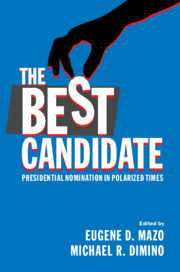Book contents
- The Best Candidate
- The Best Candidate
- Copyright page
- Dedication
- Contents
- Contributors
- Introduction
- 1 Presidential Selection: Historical, Institutional, and Democratic Perspectives
- 2 The Historical Development of the U.S. Presidential Nomination Process
- 3 Constitutional Law and the Presidential Nomination Process
- 4 Winnowing and Endorsing: Separating the Two Distinct Functions of Party Primaries
- 5 Simplifying Presidential Primaries
- 6 The Case for Standardizing Primary Voter Eligibility Rules
- 7 Primary Day: Why Presidential Nominees Should Be Chosen on a Single Day
- 8 A Eulogy for Caucuses
- 9 Floor Fight: Protecting the National Party Conventions from Manipulation
- 10 A Better Financing System? The Death and Possible Rebirth of the Presidential Nomination Public Financing Program
- 11 Campaign Finance Deregulation and the Hyperpolarization of Presidential Nominations in the Super PAC Era
- 12 Democratizing the Presidential Debates
- 13 The Influence of Technology on Presidential Primary Campaigns
- 14 Women and the Presidency
- 15 The Nomination of Presidential Candidates by Minor Political Parties
- 16 Reforming the Presidential Nominating Process: A Curmudgeon’s View
- Index
10 - A Better Financing System? The Death and Possible Rebirth of the Presidential Nomination Public Financing Program
Published online by Cambridge University Press: 10 September 2020
- The Best Candidate
- The Best Candidate
- Copyright page
- Dedication
- Contents
- Contributors
- Introduction
- 1 Presidential Selection: Historical, Institutional, and Democratic Perspectives
- 2 The Historical Development of the U.S. Presidential Nomination Process
- 3 Constitutional Law and the Presidential Nomination Process
- 4 Winnowing and Endorsing: Separating the Two Distinct Functions of Party Primaries
- 5 Simplifying Presidential Primaries
- 6 The Case for Standardizing Primary Voter Eligibility Rules
- 7 Primary Day: Why Presidential Nominees Should Be Chosen on a Single Day
- 8 A Eulogy for Caucuses
- 9 Floor Fight: Protecting the National Party Conventions from Manipulation
- 10 A Better Financing System? The Death and Possible Rebirth of the Presidential Nomination Public Financing Program
- 11 Campaign Finance Deregulation and the Hyperpolarization of Presidential Nominations in the Super PAC Era
- 12 Democratizing the Presidential Debates
- 13 The Influence of Technology on Presidential Primary Campaigns
- 14 Women and the Presidency
- 15 The Nomination of Presidential Candidates by Minor Political Parties
- 16 Reforming the Presidential Nominating Process: A Curmudgeon’s View
- Index
Summary
In the spring of 1974, the 31-year-old junior Senator from Delaware, Joseph R. Biden, Jr., published a law review article in which he decried the traditional system of privately financed election campaigns. Private financing, Senator Biden contended, “affords certain wealthy individuals or special interest groups the potential for exerting a disproportionate influence over both the electoral mechanism and the policy-making processes of the government.” Moreover, Biden urged, private funding poses an obstacle to the candidacies of “individuals of moderate means” and so was at odds with the “concept of American democracy [that] presumes that all citizens, regardless of access to wealth, have equal access to the political process.” In addition, he argued that private funding favored incumbents. To address the “Political Darwinism” of private financing, Biden called on Congress to adopt a system of public funding for all federal candidates.
Keywords
- Type
- Chapter
- Information
- The Best CandidatePresidential Nomination in Polarized Times, pp. 235 - 259Publisher: Cambridge University PressPrint publication year: 2020
- 2
- Cited by

